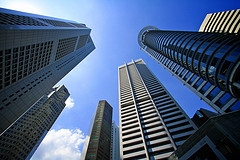
Radiant real estate: 70% of investors to expand property portfolio
And 68% expect higher market returns over the next 12 months.
According to Pacific Star Group’s Asian Property Outlook & Strategy, the real estate environment in Asia continued to see further improvements in the underlying fundamentals following a strong 2010, sustained by favourable economic conditions and positive consumer sentiment in most markets. Capital values have risen on the back of solid rental growth as these economies continued their strong expansion.
The economic cycle is starting to settle into a more sustainable rate and this should continue to help support Asian real estate. Given the strong underlying fundamentals in the Asian real estate market, the majority of investors (70%) are looking to expand their property portfolio over the next 12 months. 68 % of investors surveyed expect higher market returns over the next 12 months.
Transaction volumes have moderated but likely to pick up towards year end
Real estate investments in Asia moderated this year to reach USD 25 billion in the second quarte. Investors exercised greater caution and held back investments as the debt crisis in Europe intensified. In spite of the devastating earthquake in Japan, there has not been any serious cancellation of deals.
Rather, market players appear to be adopting a wait-and-see attitude in the light of ongoing difficulties in Asia’s largest real estate market. As a result, we expect volumes to slow in the short-term before picking up again towards the end of the year as uncertainty clears and investor confidence resumes.
Residential tightening measures will divert capital towards the commercial sector -- outlook most favourable for retail asset
Despite the normalisation of monetary policies, real interest rates in many Asian countries remain negative or low, as a result of high inflation. However, the transmission effects of monetary policies are often lagged and affordability could come under some pressure going forward. Government efforts to cool the residential sectors, especially in China, seem to be diverting some investment interest into commercial real estate. This will boost available capital for institutional investment and drive up competition for quality assets.
We favour the retail and hospitality assets, which are expected to receive increased interests in response to rising consumerism and tourism in the region. Strong wage increase and healthy consumer sentiment across the region will support retail spending. Prime office properties continue to be favoured by investors due to strong leasing demand from corporate expansion, although we expect a softer economic outlook going forward. Some markets, especially in Southeast Asia, could face an oversupply in the near-to-medium term. For the reasons mentioned above, we maintain a cautious outlook for the residential sector.
Industrial sector could see renewed interest
We could also see more investor attention turn towards the industrial sector, in light of the rebuilding efforts for manufacturing facilities in Japan. An example is the instance of recent bids by four entities (including Blackstone Group and Global Logistic Properties) for 24 warehouses owned by LaSalle Investment Management in Tokyo and Osaka. The widening gap between office and industrial rents will also divert some interest to the industrial sector.
As firms rethink their supply chain and risk mitigation strategies, we are likely to see growing interest (leasing and owner-occupation) gravitate towards quality office and industrial assets in good locations. While costs could be higher in prime locations, it will be outweighed by the savings generated in transportation costs which typically form a much larger portion of total operating costs than real estate costs.
Photo credit: marboed
























 Advertise
Advertise






